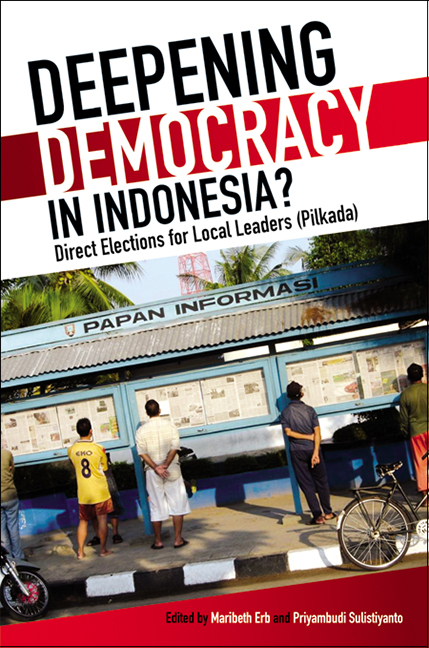Book contents
- Frontmatter
- Dedication
- Contents
- List of Tables
- List of Figures
- Contributors
- Acknowledgements
- Glossary
- 1 Indonesia and the Quest for “Democracy”
- 2 Pilkada Langsung: The First Step on the Long Road to a Dualistic Provincial and District Government
- Part I Political Parties, Politician Elites and the Voters
- Part II Media and Campaigns: Comparing Local and National Elections
- Part III Conflict, Ethnicity, and Political Divisions
- Index
1 - Indonesia and the Quest for “Democracy”
Published online by Cambridge University Press: 21 October 2015
- Frontmatter
- Dedication
- Contents
- List of Tables
- List of Figures
- Contributors
- Acknowledgements
- Glossary
- 1 Indonesia and the Quest for “Democracy”
- 2 Pilkada Langsung: The First Step on the Long Road to a Dualistic Provincial and District Government
- Part I Political Parties, Politician Elites and the Voters
- Part II Media and Campaigns: Comparing Local and National Elections
- Part III Conflict, Ethnicity, and Political Divisions
- Index
Summary
DEMOCRACY AND ELECTIONS: WHAT ROLE DOES THE VOTE HAVE IN DEMOCRACY?
“The voting issue…is the only issue that addresses questions of power and power relationships…. It's the one right you have to have to protect all your other rights — to choose who's going to lead, [who are] going to be policy makers … who's going to run things, and how they're going to run things.”(Abramsky 2006)
“There is not a single regime in the world of the second half of the 20th century which openly repudiates democracy.” (Sato 1997, p. 82)
The question of the vote, and its relationship to democracy, became especially pertinent in the opening years of the twenty-first century, when in the United States 2000 elections the popular vote was won by one person, and yet the election was won by someone else. This unlocked considerable discussion about the meaning of the vote, different systems of voting, and their relationship to democracy. Is the will of the majority democratic? Or is it the “rule of law” that determines democracy (Emmerson 2001, p. 26)? In the smaller country of Singapore, two elections in the twenty-first century have seen an increase in discontent that many election districts have no candidates to oppose the dominant party, so a majority of citizens never vote. Is voting then actually essential to a democracy? The largest country in Southeast Asia, Indonesia, has seen tremendous electoral activity in the first years of the twenty-first century, including constitutional and institutional reforms that have allowed very different types of electoral systems to emerge, and allowed Indonesians to directly vote in their national and local leaders.
In Abramsky's new book (2006), which discusses the massive disenfranchisement of prisoners and ex-prisoners in many American states, suffrage is presented as a fundamentally important right in a democracy, and yet in many regimes that call themselves democracies leaders have never been directly voted in by the people. In this introduction we want to reflect on the question of democracy and the introduction of the recent direct vote in Indonesia, in this time of “democratic transitions” in Asia (Johannen and Gomez 2001).
- Type
- Chapter
- Information
- Deepening Democracy in Indonesia?Direct Elections for Local Leaders (Pilkada), pp. 1 - 37Publisher: ISEAS–Yusof Ishak InstitutePrint publication year: 2009

